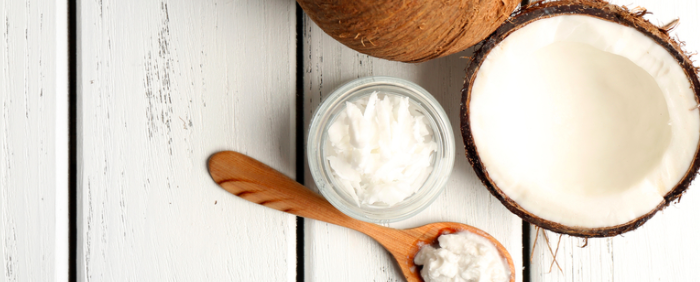
In recent years, coconut oil has attracted a lot of interest from social networks and the internet. However, you have to look twice before you buy coconut oil galore.
Coconut and saturated fat
As incredible as it may sound, coconut oilcontains six times more saturated fat than olive oil, or about 12 grams per table spoon. “For most people, that’s more than half of the recommended daily intake,” says Edwina Clark, dietician and director of the app’s nutrition and health department and Yummly website. It is true that not all saturated fats are equal. For example, coconut oil contains a particularly high level of lauric acid, a saturated fat that increases the level of good cholesterol (HDL) as do unsaturated fats. But, lauric acid also causes bad cholesterol (LDL) and total cholesterol to rise. Edwina Clark points out that, on the contrary.
Attention to abuse
Once you’ve fallen in love with the tropical taste of coconut oil, you might be tempted to use it to fry, fry, grill or cook all your dishes. “Coconut oil will bring a touch of exoticism to toast, granola bars, nut butters, smoothies , popcorn and soups,” says Edwina Clark. But do not forget that a tiny amount is enough. For cooking in general, olive oil (especially extra virgin) and other vegetable oils such as canola, safflower and sunflower oils are the most appropriate. “Do not exceed 1 to 2 tbsp. every day to meet the recommendations in saturated fat and take care of the health of your heart, “says Edwina Clark.
Coconut oil is not a superfood
It may be hard to believe after all we heard about the blogosphere, but coconut oil is not a superfood like salmon . “So far there is no comprehensive study or research to support coconut oils and butters to boost energy, enhance immunity, cure hypothyroidism, increase satiety or decrease cravings, “writes dietitian Nicole Morrissey on her blog PreventionRD .com . Coconut oil has antioxidant components that may reduce the risk of certain diseases. “We talked about a” miracle cure “for heart disease, weight loss, cholesterol lowering, and to prevent or delay the onset of Alzheimer’s disease , “says Gary Appelsies, head of healthy eating at the Central Florida YMCA. “That coconut oil is useful for treating certain chronic diseases, it’s like the rest, we have not seen everything yet. ”
There are other healthier fats for your health
We know today that dietary fat is not as dangerous to health as it was a few decades ago. But, there are better sources of fat for health than coconut: it is the case of nuts, seeds and avocados. “Do not forget to add fresh fruits and vegetables, whole grains, lean or plant-based proteins to your daily diet,” says Gary Appelsies. It is the combination of all these elements that will have a positive effect on your health and your body, not just the fashionable product that claims to be the new miracle.
Hidden trans fats
When you buy coconut oil, check on the label if it does not contain hydrogenated or partially hydrogenated oil, which would indicate the presence of trans fat. ” Trans fat will never be a good fats for health,” Morrissey says.
Surprising benefits
Coconut oil is effective against plaque. ” Oil pulling is used in traditional Ayurvedic medicine,” says Monica Amsterdam, director of nutrition at the Cedar Knolls Medical and Wellness Center of New Jersey. For 15 minutes, circulate coconut oil (without swallowing) between your teeth to dislodge plaque, she advises. Continue another 30 to 45 minutes to improve your overall health. “This process allows oil to suck up viruses, bacteria and yeasts,” she says. The best time to do this is the morning before breakfast: this oral treatment improves the health of your teeth and your overall health.
Coconut oil does not lose weight
Moderate consumption of coconut oil can be part of a healthy and balanced diet, but it will not make you lose weight, as some have suggested. “Coconut oil has a lot of calories and more saturated fat than fat (90% versus 40%),” says Farzaneh Daghigh, a professor of biochemistry and gastroenterology at the College of Osteopathic Medicine (Philadelphia). A dose of 15 ml (1 tablespoon) provides over 13 g of fat and 125 calories. If you consume too much, you will absorb calories that will cause your body to store more fat. ”
More satiety but more calories too
The fat concentration of the coconut oil falsely indicates to the leptin receptors that you are satiated, which can decrease your hunger and possibly your appetite. Good if it takes you away from the cookie tin , but it does not affect your total calorie consumption . “A 15 ml dose of coconut oil contains about 125 calories “Says Patrick Henigan, owner of the Jacksonville Fitness Academy training center (Florida). “Although it may be” good “calories, it does not change the fact that an excess of calories will result in weight gain. If you add coconut oil to your diet, you will need to reduce calories from other foods. “Wherever they come from, extra calories will make you gain weight,” he says.